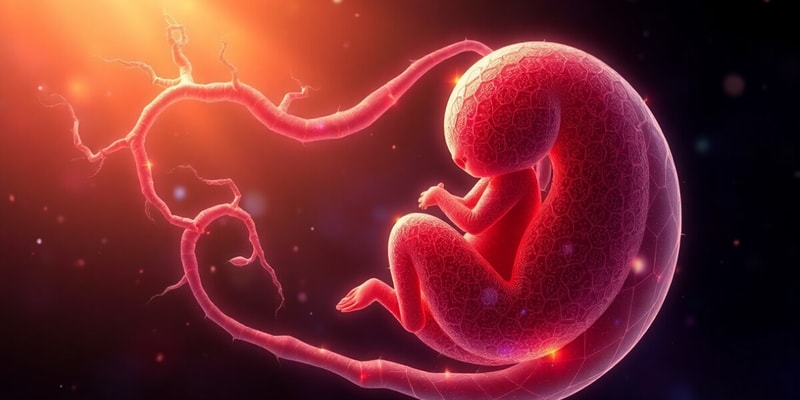Podcast Beta
Questions and Answers
What is the primary focus of embryology?
What is the duration of the fetal development stage?
During which period does organogenesis occur?
What does the term 'teratogen' refer to?
Signup and view all the answers
At what point is a fetus considered full-term?
Signup and view all the answers
What characterizes the preorganogenic period of development?
Signup and view all the answers
What happens during the organogenic period?
Signup and view all the answers
What distinguishes preterm infants from full-term infants?
Signup and view all the answers
Which period marks the beginning of rapid body growth?
Signup and view all the answers
How long does a typical human gestation last?
Signup and view all the answers
When does the formation of the Central Nervous System begin?
Signup and view all the answers
Which structure is present during the embryonic phase?
Signup and view all the answers
What is the primary function of the acrosomal granule formed during spermiogenesis?
Signup and view all the answers
What may happen if a woman is exposed to harmful substances during the pre-organogenic period?
Signup and view all the answers
What is the zona pellucida?
Signup and view all the answers
Which organ system completes its main structures by the 6th week of gestation?
Signup and view all the answers
Where do mitochondria form during spermiogenesis?
Signup and view all the answers
What characterizes the embryonic precursor of an organ?
Signup and view all the answers
Which part of the sperm cell is responsible for energy supply?
Signup and view all the answers
Study Notes
Developmental Biology and Embryology
- Developmental biology focuses on the growth and development of organisms.
- Embryology is a subfield studying the development of the embryo from fertilization (zygote) to differentiation into tissues and organs.
- Embryogenesis refers to the embryonic stage up to the 8th week after conception in humans, including organogenesis (formation of organs and organ systems).
- Fetal development follows the embryonic stage, from the 8th week to birth, focusing on tissue and organ maturation and rapid body growth.
Periods of Human Development
-
Pre-organogenic Period (Weeks 1-2):
- Zygote division, implantation in the uterine wall, and formation of a bilaminar embryo.
-
Organogenic Period (Weeks 3-8):
- Critical period for teratogens (agents causing birth defects), as major organs develop.
- Formation of structures such as eyes, ears, heart, limbs, teeth, and palate.
-
Fetal Period (Weeks 9-42):
- Characterized by tissue and organ maturation and rapid growth, leading to birth.
- Full gestation in humans typically takes 40 weeks.
- A baby born at 37 weeks is considered full term.
- Premature birth occurs before 37 weeks, while post-term birth occurs after 42 weeks.
Chart for Periods of Human Development
-
Figure 1: Shows the development of various organs and organ systems over time using a color-coded bar chart.
- Red portion: Represents organ formation.
- Yellow portion: Represents organ differentiation and maturation.
- The chart depicts the developmental timeline for:
- Central Nervous System (CNS)
- Heart
- Upper Limbs
- Eyes
- Lower Limbs
- Teeth
- Palate
Exposure to Harmful Substances
- Pre-organogenic Period: Exposure to harmful substances during this period increases the risk of spontaneous abortion and fatal congenital anomalies.
- Embryonic Period: Exposure during this period increases the risk of major morphological abnormalities (problems with organ shape and form).
- Important Consideration for Pregnant Women: It's crucial to be aware of the potential impact of teratogens during pregnancy, as the development of major organs occurs within the first 8 weeks, often before a woman confirms her pregnancy.
Embryonic vs. Fetal
- Embryonic structures: Refer to organs or tissues present during the pre-organogenic or organogenic phases of embryonic development.
- Fetal structures: Refer to organs or tissues present during the fetal period as organs mature.
- Example: The embryonic structure for the navel/umbilicus is the connective stalk, while the equivalent fetal structure is the umbilical cord.
Gametes (Spermatozoon & Oocyte)
-
Spermatozoon (Sperm Cell):
- Male gamete composed of condensed DNA from the father.
-
Structure:
- Head: Contains condensed DNA.
-
Tail (flagellum):
- Middle piece: Contains mitochondria for energy.
- Principal piece: Main section of the tail.
- End piece: Terminal section of the tail.
- Neck: Connects the head and tail.
-
Oocyte (Egg Cell):
- Round cell containing a nucleus, nucleolus, and cytoplasm.
- Travels through the fallopian tube awaiting fertilization.
- Zona pellucida: Glycoprotein coat surrounding the ovum.
- Corona radiata: Follicular cells surrounding the zona pellucida.
Spermiogenesis
- The process of transforming and maturing a spermatid (immature sperm cell) into a mature spermatozoon.
-
Chronological Events:
- **Acrosomal Granule Formation: ** The Golgi apparatus forms acrosomal granules containing enzymes crucial for sperm penetration of the egg.
- Granule and Centriole Movement: The acrosomal granule moves to the sperm nucleus' pole, while centrioles relocate to opposite poles.
- Acrosomal Cap Formation: The acrosomal granule forms the acrosomal cap, covering half of the nucleus, and the nucleus moves to the cell surface. Other organelles move to the opposite pole.
- Flagellum Formation: A flagellum (tail) develops at the opposite pole.
- Mitochondrial Ring Formation: Mitochondria arrange into a ring-like structure surrounding the middle piece of the tail.
Studying That Suits You
Use AI to generate personalized quizzes and flashcards to suit your learning preferences.
Description
Test your knowledge on developmental biology and embryology, focusing on the growth stages from zygote to fetal development. Explore key concepts like embryogenesis, organogenesis, and the different periods of human development. Perfect for students diving into this fascinating field!




